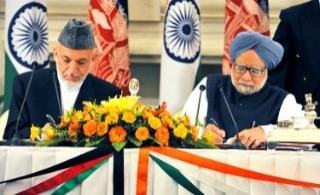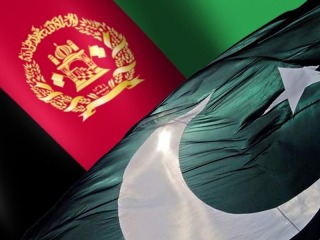“CACI Analyst, January 22, 2014”
Afghanistan and India Deepen Strategic Cooperation
By Richard Weitz (the 22/01/2014 issue of the CACI Analyst)
India has made major economic, political, and strategic investments in Afghanistan since the Taliban lost power in 2001. The two countries share an interest in Afghanistan’s postwar reconstruction, pursuing common diplomatic goals, and cooperating against mutual security threats. For years, India has been undertaking programs to bolster Afghanistan’s security capabilities and integrate the country into regional diplomatic and economic structures. Now with the withdrawal of Western combat forces, India is acceding to longstanding Afghan government requests and deepening bilateral security cooperation, despite the risks of provoking a strong and adverse reaction in Islamabad, as well as enlarging their economic collaboration.

Pakistan's New Strategic Leadership and the Afghanistan Situation
By Naveed Ahmad (the 08/01/2014 issue of the CACI Analyst)
Pakistan’s third-time Prime Minister Nawaz Sharif has appointed a new Chief of Army Staff replacing former President Pervez Musharraf’s handpicked man, General Ashfaq Pervez Kiani. The elevation of General Raheel Sharif made global headlines primarily due to the country’s nuclear capability and its military’s tendency to intervene in politics through overt coup d’états. General Sharif, however, assumes leadership of the world’s sixth largest military at a time when NATO troops are in a process of withdrawing from Afghanistan after a presence lasting over a decade. Despite Pakistan’s improved democratic credentials, the leverage of its army chief on policies towards Afghanistan and India is likely to remain as decisive as it has ever been.

“CACI Analyst, November 13, 2013”
TTP-Pakistan Dialogue: The Post-Hakimullah Scenario
By Rizwan Zeb (the 13/11/2013 issue of the CACI Analyst)
After the death of Tehreek-e-Taliban Pakistan (TTP) leader Hakimullah Mehsud in a U.S. drone attack and the appointment of the hardliner and staunchly anti-Pakistan Mullah Fazlullah, prospects for Pakistan’s dialogue process with the TTP seem bleak. Prime Minister Nawaz Sharif nevertheless pledged to continue the peace talks. At the heart of this decision is the confusion that after more than a decade, Pakistan’s political leadership is still debating whether this is its war and whether they should talk to its own people. This position indicates a clear lack of understanding of the jihadist mindset, and of the realities and challenges that Pakistan is facing.



